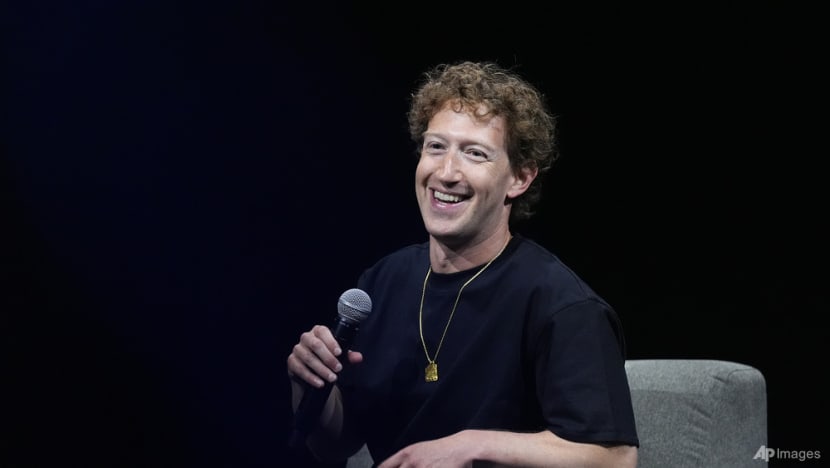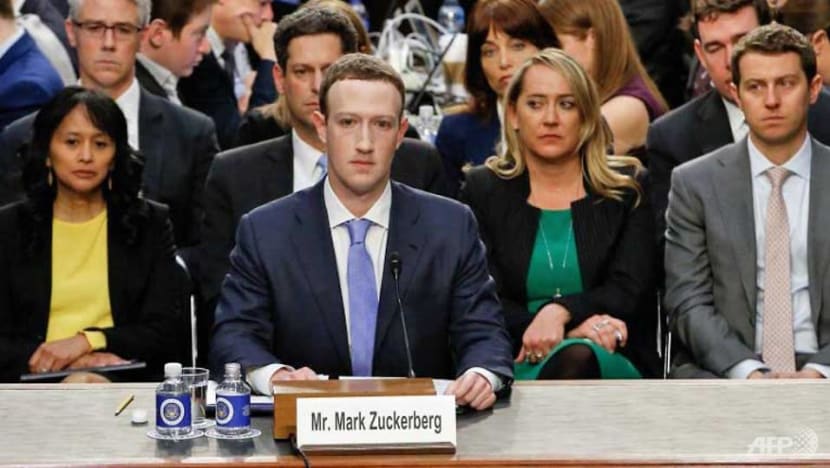Commentary: Why Mark Zuckerberg ditched T-shirts and hoodies for streetwear and gold chains
Meta CEO Mark Zuckerberg is trying to convince users that his apps are platforms for entertainment, not political debate, says writer Keith Yap.


This audio is generated by an AI tool.
SINGAPORE: In a video released by Meta on Jan 7, CEO Mark Zuckerberg explained his company’s decision to roll back its content moderation policies on Facebook and Instagram. The move marks a policy reversal as US president-elect Donald Trump prepares to take office this month.
Days later, Zuckerberg appeared on Joe Rogan’s podcast for a nearly three-hour conversation, during which he discussed Meta’s evolving content moderation policy, his passion for mixed martial arts, and why corporate America needs more “masculine energy”.
But that’s not the Zuckerberg we used to know. Over the past few years, Zuckerberg has undergone a drastic makeover. He has ditched plain T-shirts and hoodies for high-fashion streetwear and gold chains. He hangs out with MMA fighters, dresses up as John Wick for Halloween and designs Porsche Minivans for his wife, Priscilla Chan.
You might dismiss this as Zuckerberg “re-discovering” his authentic self and not consider it worthy of further study. However, Zuckerberg’s role as founder and CEO of one of the world’s most valuable companies directly impacts how citizens and policymakers view the company.
FROM SILICON VALLEY DARLING TO “LIZARD PERSON”
In the 2010s, Mark Zuckerberg was seen as an innovator and pioneer of social media. He epitomised the Silicon Valley culture of “moving fast and breaking things”, also embraced by startups in his cohort like Airbnb and Uber.
However, Facebook’s path to dominance left a trail of broken things. The controversy that substantially damaged Zuckerberg’s image was the Cambridge Analytica scandal, in which the personal data of millions of Facebook users was harvested without their permission.
Zuckerberg was called to testify before US Congress in 2019 and was grilled about Facebook’s lax data privacy controls. His monotonous replies and carefully orchestrated movements – likely due to his inexperience with intense regulatory scrutiny – led to internet users calling him “a lizard person” or a robot designed to take over the world.
In 2021, whistleblower Frances Haugen revealed that Facebook had internal knowledge that Instagram’s engagement-based ranking harms teenage mental health, but did not amend its content moderation policy. Policymakers have taken action since – France and a few US states have restricted minors’ access to social media, and in November 2024, Australia banned social media for children under 16.
From the darling prodigy of Silicon Valley, Zuckerberg became one of America’s most controversial household names – the tech tsar who cares more about his company’s bottom line than its detrimental effects on the public.

FACEBOOK BECOMES META
On Oct 28, 2021 – three weeks after France Haugen’s testimony at the Senate hearing – Zuckerberg announced that Facebook would be Meta. The move captured his desire to fix Facebook’s poor brand image by pivoting towards the building of newer technologies.
As a result, in all subsequent financial filings, Meta reported its business as two different segments: Its family of apps (Facebook, Instagram, WhatsApp) and its work on future platforms such as its virtual reality products like the metaverse and VR headset Oculus.
Meta’s US$46 billion investment in the metaverse has flopped, and coupled with TikTok’s meteoric global adoption, put serious pressure on Meta. Meta’s stock tumbled a whopping 76 per cent from its all-time high in September 2021 to October 2022.
However, Zuckerberg responded decisively. Meta’s earning transcripts in the past two years show Meta’s ability to recover and its potential to be more than just a social media company.
Within its family of apps business, its non-ad revenue increased significantly. For example, in the third quarter of 2024, Meta’s non-ad revenue rose by 48 per cent to US$434 million, driven primarily by revenue growth from the WhatsApp Business Platform.
Meta has also pivoted towards artificial intelligence with its open-source Llama language models, while simultaneously focusing on its suite of VR products. Through its subsidiary, Reality Labs, Meta has collaborated with iconic American fashion brands like Ray-Ban to develop AI-enabled wearables.
DISTANCING META FROM POLITICS
Despite the headlines from Meta about its efforts in AI and hardware development, Meta is still primarily a social media company. In the third quarter of 2024, 98 per cent of its US$41 billion revenue came from advertising revenue on its social platforms.
Zuckerberg wants to ensure that Meta avoids regulatory scrutiny and remains advertiser-friendly. The best way to do it is to steer clear of promoting political content.
Before Meta’s decision to end its fact-checking efforts, Zuckerberg wrote a letter to the US Committee on the Judiciary highlighting his desire to distance Meta and himself from politics, due to the perception that the company’s content moderation policies “benefited one party over the other”.
Zuckerberg seems to be creating a new narrative for users regarding what content they should expect from his company. His message is simple: Meta apps are built for people to share their highlight reels, interact with friends and have fun.
As such, Zuckerberg is convincing users to stop seeing Meta’s social apps as platforms for political debate and instead as platforms for entertainment, thereby reducing advertisers’ concerns about regulatory risks.
This is perhaps best illustrated by his appointment of Dana White, the CEO of the global MMA company UFC, to his board. On the one hand, it is a strategic move undertaken by Zuckerberg to better align with the incoming US president Trump, as White is one of his most influential political allies.
On the other hand, White’s inclusion in Meta’s board marks its first inclusion of a corporate leader from the entertainment industry - signalling a push to make their social apps’ experience more entertaining.
So far, Zuckerberg’s rebrand has worked like a charm. The comment sections of his Instagram posts, previously laden with angry accusations and critiques, are now filled with athletes, entertainers and fans making light-hearted jokes about him or Meta’s products.
AN EFFECTIVE REBRAND
This year, Meta will replace its third-party fact-checkers with Community Notes, a crowdsourced approach to reviewing online content. It will terminate diversity, equity and inclusion (DEI) initiatives, and cut 5 per cent of its workforce to “raise the bar” on performance management.
While sharp criticism of Zuckerberg’s latest moves has emerged from mainstream media outlets, he did not experience 2019 levels of widespread public acrimony – a sign that his rebrand has been silently effective.
Ultimately, Meta’s current business model depends on keeping users engaged and advertisers paying.
With Zuckerberg’s warming of relations with incoming US president Donald Trump, coupled with Meta’s depoliticisation of its platforms, Meta will likely face lesser public and regulatory scrutiny in the next four years, allowing Zuckerberg to focus on building his technology empire.
Keith Yap is a podcaster who hosts The Front Row Podcast.


















